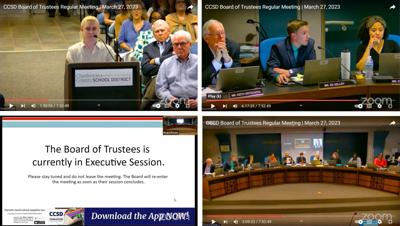We can’t imagine any circumstances under which it would be OK for an elected official to tell a group of constituents that if a teacher said something that upset his child, he would "show up at that teacher’s house with a gun.”
Not in response to a teacher informing students of a name change from Ms. to Mr., as a witness testified Monday that Charleston County School Board member Ed Kelley had done.
Not in response to a teacher telling a child she had to remain a girl because she was born a girl.
This is difficult for many of us to do, but for the purposes of this discussion, we need to set aside our feelings about transgender reveals. It doesn’t matter whether you think people should be applauded or condemned for announcing that they have changed their gender. For that matter, it doesn’t matter whether the topic that the teacher was discussing was gender or math. Regardless of the topic, regardless of whether he shares your opinion, it is always unacceptable for an elected official to imply that he would shoot a teacher.
It’s also unacceptable for anybody to imply such a thing.
The same is true whether the target of the anger was a teacher or a politician or a police officer or the annoying guy across the street.
To say you would show up at someone’s home with a gun if he said something that angered you — to imply that shooting or threatening to shoot someone is an acceptable way to express your anger — is simply not something we as a society can condone, even if we share the speaker’s anger. Under some circumstances, it is criminal behavior.
And yet apparently a member of the Charleston County School Board sees nothing wrong with it, since he did not immediately interrupt the meeting to deny he ever said such a thing or else apologize for having temporarily lost his mind while addressing the political group Moms for Liberty. Because, let’s be clear: Those are the only two acceptable responses to such an allegation.
Normally, we would have to assume that Mr. Kelley might not have actually said such a completely unacceptable thing, particularly since the allegation came from the uncorroborated testimony of someone who admittedly opposes his political agenda. In this case, we are under absolutely no such obligation. To the contrary, we should assume that’s precisely what he said, because he did not deny it.
Worse, he then tried to justify his silence by citing a gross mischaracterization of a school board policy that is itself a legally questionable extension of a frequently abused and mischaracterized exemption in South Carolina’s open meetings law.
As The Post and Courier’s Sara Gregory reports, Mr. Kelley did not address the claim during the meeting, and he declined to discuss it afterward, explaining in a text message: “The topic of the accusations leveraged against me were discussed in executive session tonight. Therefore, I’m prohibited by policy to discuss it outside of the Board.”
The first problem with this dodge is that with a small number of discrete exceptions — none of which would apply here — state law does not prohibit anyone from talking publicly about matters that are discussed in executive session. State law doesn't even require boards to discuss anything more than a small number of items in secret. In most cases, it merely allows secret discussions.
The Charleston County School Board does have an internal policy that says board members “are duty-bound not to disclose matters discussed in executive session.” We seriously doubt the board could enforce that prohibition, because it undermines state law, requiring people to keep quiet about matters that the state's open meetings law does not require them to keep quiet about.
But even if Mr. Kelley were barred from discussing executive session discussions, that doesn’t prohibit him from discussing whether he actually said he would have showed up at the teacher’s house with a gun if he had a child who was upset about the teacher's declaration. All it would prohibit him from discussing is what other board members said about it behind closed doors.
Which brings us to another apparent abuse, this time by the entire board, if in fact the board discussed Mr. Kelley's implicit threat in executive session: We can’t find anything in state law that allows a board to have a secret discussion about inappropriate comments made by one of its members, unless there’s pending litigation against the board. Now, it’s possible that the board was discussing why that teacher is currently on administrative leave, which would be allowed by law if the board informed the public it was discussing a personnel matter involving a teacher. But that still wouldn’t justify a discussion about whether or not Mr. Kelley made the threat — which is what he claimed he was barred from discussing.
And not to put too fine a point on this whole government transparency thing, but the board did not amend its executive session agenda to add anything about Mr. Kelley’s threat, and the only items on the agenda that could have concerned the teacher were the unspecified “legal briefing” and “receipt of legal advice.” Those terms of course are vague enough to cover a world of sins — which is why we believe they’re too vague to comply with state law.
Mr. Kelley needs to either explain how his accuser got his comments wrong or else apologize for them. He also needs to join the long line of public officials who owe the public an apology for misusing the Freedom of Information Act as an excuse to dodge uncomfortable questions.
Click here for more opinion content from The Post and Courier.
















